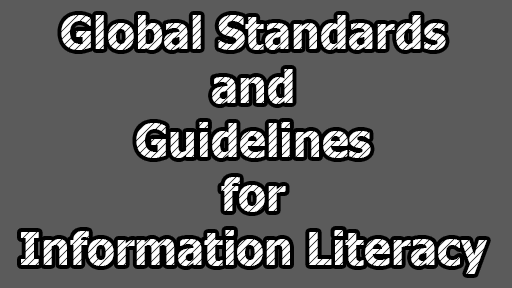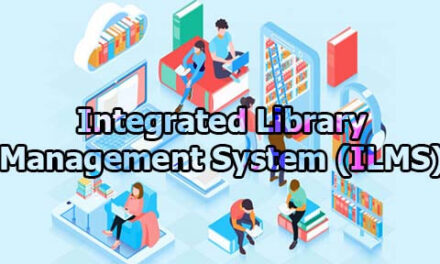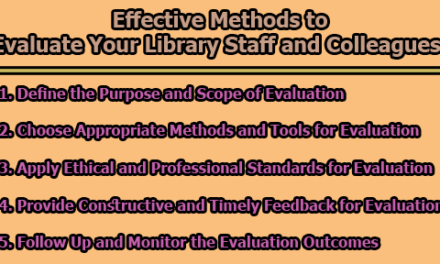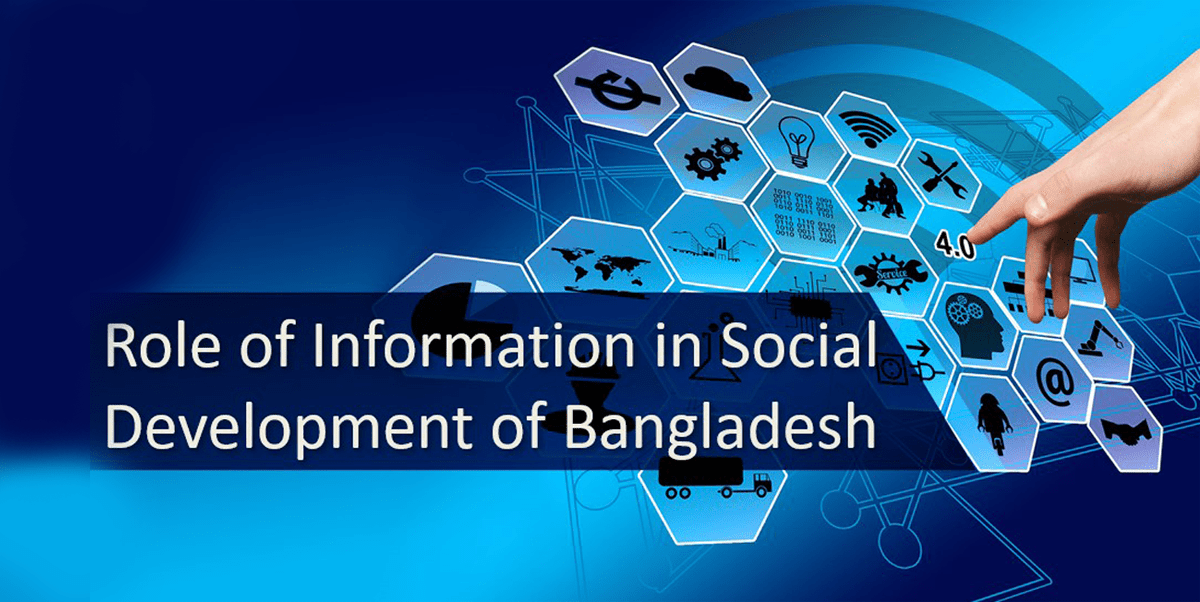Global Standards and Guidelines for Information Literacy:
The advent of the digital age has revolutionized the way information is produced, shared, and accessed. While this has opened up unprecedented opportunities, it has also posed challenges in terms of the sheer volume of information available and the need to discern accurate and reliable sources. Global standards and guidelines for information literacy serve as a framework to navigate these challenges, fostering critical thinking, digital literacy, and lifelong learning skills.
The Rationale for Global Standards:
The need for global standards and guidelines arises from the interconnected nature of information and the growing importance of information literacy in all spheres of life. These standards serve as a common foundation for educational institutions, policymakers, and individuals across diverse cultural, linguistic, and socioeconomic contexts. They promote consistency, coherence, and quality in information literacy education.
International Initiatives:
Several international organizations have played pivotal roles in the development of global standards and guidelines for information literacy. Notable initiatives include:
A. UNESCO’s Information for All Programme (IFAP): IFAP has been instrumental in fostering global cooperation and setting guidelines for information literacy. It aims to promote equitable access to information, knowledge preservation, and ethical use of information. IFAP’s efforts have resulted in the formulation of the Alexandria Proclamation and the Prague Declaration on Information Literacy.
B. International Federation of Library Associations and Institutions (IFLA): IFLA, in collaboration with UNESCO, has developed the Information Literacy Guidelines, providing a comprehensive framework for information literacy education. These guidelines emphasize the integration of information literacy into educational curricula and lifelong learning programs.
C. Association of College and Research Libraries (ACRL): ACRL, a division of the American Library Association, has developed the Framework for Information Literacy for Higher Education. This framework emphasizes the development of critical thinking, metacognition, and lifelong learning skills in the context of information literacy.
Components of Global Standards and Guidelines:
Global standards and guidelines for information literacy typically encompass the following key components:
- Information Seeking Strategies: These guidelines focus on developing effective search strategies, understanding search engines, databases, and other information retrieval tools, and evaluating the relevance and reliability of sources.
- Critical Evaluation of Information: These standards emphasize the ability to critically analyze information sources, detect bias, verify credibility, and distinguish between reliable and misleading information.
- Ethical Use of Information: Guidelines related to the ethical use of information emphasize copyright laws, plagiarism, citation practices, and responsible use of digital resources.
- Digital Literacy and Technological Skills: Given the increasing reliance on digital technologies, these standards focus on developing digital literacy skills, including digital communication, online collaboration, and data management.
- Lifelong Learning and Adaptability: Information literacy standards recognize the need for continuous learning and adaptation in the face of rapidly evolving information landscapes. They emphasize the development of skills such as self-directed learning, critical thinking, and problem-solving.
Implementation Challenges and Strategies:
The implementation of global standards and guidelines for information literacy faces certain challenges, including varying educational systems, cultural contexts, and limited resources. To address these challenges, strategies such as curriculum integration, teacher training programs, public awareness campaigns, and international collaboration can be employed.
Impact and Benefits:
The adoption of global standards and guidelines for information literacy can yield numerous benefits at individual, societal, and global levels. These include:
- Empowering individuals to make informed decisions, participate actively in democratic processes, and engage in lifelong learning.
- Enhancing critical thinking skills, enabling individuals to navigate the complexities of the digital world and distinguish between reliable and misleading information.
- Reducing the spread of misinformation and disinformation by fostering a discerning and responsible information culture.
- Bridging the digital divide by promoting equitable access to information and digital resources.
- Promoting cultural understanding and global citizenship by fostering awareness of diverse perspectives and information sources.
Here are some additional details to further expand on the topic of global standards and guidelines for information literacy:
Integration into Educational Systems: To effectively implement global standards and guidelines for information literacy, integration into educational systems is crucial. This integration can occur at various levels, including primary, secondary, and tertiary education. Educational institutions should incorporate information literacy skills into their curricula, ensuring that students receive systematic and progressive instruction throughout their academic journey. This integration can be achieved through dedicated courses, library programs, collaboration between teachers and librarians, and embedding information literacy into subject-specific coursework.
Teacher Training and Professional Development: Equipping educators with the necessary skills and knowledge to teach information literacy is vital for successful implementation. Teacher training programs should be developed to enhance educators’ understanding of information literacy concepts, teaching methodologies, and assessment strategies. Ongoing professional development opportunities, workshops, and conferences can further support teachers in staying updated with the evolving landscape of information literacy and effective instructional practices.
Collaboration and Partnerships: Successful implementation of global standards and guidelines for information literacy requires collaboration and partnerships among various stakeholders. Collaboration between educational institutions, libraries, information professionals, and policymakers can facilitate the sharing of resources, expertise, and best practices. Partnerships with organizations in the private sector, civil society, and the media can also contribute to raising awareness about information literacy and promoting responsible use of digital information.
Assessing Information Literacy Skills: Assessment plays a vital role in evaluating students’ information literacy skills and progress. Assessment methods should align with the objectives outlined in global standards and guidelines, emphasizing the application of critical thinking, problem-solving, and information evaluation skills. Assessment tools may include performance-based tasks, research projects, oral presentations, or online quizzes that gauge students’ ability to locate, evaluate, and use information effectively.
Digital Citizenship and Online Safety: Global standards and guidelines for information literacy should encompass the principles of digital citizenship and online safety. This involves educating individuals about their rights and responsibilities in the digital space, promoting ethical behavior, respecting privacy, and fostering responsible digital engagement. Information literacy education should also address issues such as online security, cyberbullying, digital footprints, and the appropriate use of social media platforms.
Continuous Evaluation and Improvement: The development and implementation of global standards and guidelines for information literacy should be an iterative process. Regular evaluation and feedback mechanisms should be established to assess the effectiveness of these standards and identify areas for improvement. This feedback can be gathered through surveys, focus groups, and consultations with educators, students, and other relevant stakeholders. Incorporating emerging research findings and adapting the standards to address new challenges and technologies is essential to ensure their relevance in a rapidly evolving information landscape.
Supporting Lifelong Learning: Global standards and guidelines for information literacy should recognize the importance of lifelong learning beyond formal educational settings. Information literacy skills are vital in professional development, career advancement, and personal growth. Therefore, resources and opportunities for continuous learning should be made available to individuals of all ages. This can include online courses, workshops, community programs, and partnerships with public libraries and learning centers.
Advocacy and Public Awareness: Raising awareness about the significance of information literacy is essential for widespread adoption and support. Public awareness campaigns can educate individuals about the importance of critical thinking, digital competence, and responsible information use. Collaboration with media organizations, community leaders, and policymakers can help disseminate information and promote a culture of information literacy at the societal level.
Local Adaptation and Cultural Context: While global standards and guidelines provide a common framework, it is important to acknowledge and respect local cultural contexts and educational systems. Implementation strategies should be flexible, allowing for adaptation to local needs, languages, and resources. This can involve translating materials into local languages, incorporating culturally relevant examples, and acknowledging diverse information sources and perspectives.
Research and Knowledge Sharing: Continued research and knowledge sharing are essential to advance the field of information literacy. Researchers, educators, and practitioners should collaborate to investigate effective instructional approaches, emerging challenges, and the impact of information literacy on individuals and society. This research can contribute to the refinement and evolution of global standards and guidelines, ensuring their continued relevance and effectiveness.
In conclusion, global standards and guidelines for information literacy provide a comprehensive framework to enhance individuals’ digital competence, critical thinking skills, and responsible use of information. By embracing these standards, educational institutions, policymakers, and individuals can contribute to a more informed and empowered global society, fostering a culture of information literacy that is essential in the modern age.
FAQs:
What are global standards and guidelines for information literacy?
Global standards and guidelines for IL are a set of agreed-upon principles and frameworks that define the skills, competencies, and attitudes individuals need to effectively locate, evaluate, use, and communicate information in the digital age. These standards provide a common foundation for educational institutions, policymakers, and information professionals worldwide to promote information literacy education.
Why are global standards and guidelines for information literacy necessary?
The proliferation of information and digital technologies has made it increasingly challenging to navigate the vast amount of available information. Global standards and guidelines for information literacy address this need by providing a framework for developing critical thinking, digital competence, and responsible information use. They ensure consistency, coherence, and quality in information literacy education across diverse cultural, linguistic, and socioeconomic contexts.
Who develops global standards and guidelines for information literacy?
Several international organizations have played pivotal roles in developing global standards and guidelines for IL. Notable initiatives include UNESCO’s Information for All Programme (IFAP), the International Federation of Library Associations and Institutions (IFLA), and the Association of College and Research Libraries (ACRL). These organizations collaborate with experts, educators, and stakeholders to create and refine these standards.
What are the key components of global standards and guidelines for information literacy?
Global standards and guidelines for IL typically encompass various key components, including information-seeking strategies, critical evaluation of information, ethical use of information, digital literacy and technological skills, and the promotion of lifelong learning and adaptability. These components collectively enable individuals to effectively navigate the digital information landscape.
How can global standards and guidelines for information literacy be implemented?
Implementing global standards and guidelines for IL requires collaboration and integration into educational systems. This can involve curriculum integration, teacher training programs, public awareness campaigns, and partnerships among educational institutions, libraries, policymakers, and other stakeholders. Continuous evaluation, feedback mechanisms, and research are essential to refine and improve the implementation process.
What is the impact of global standards and guidelines for information literacy?
Adopting global standards and guidelines for IL has numerous positive impacts. It empowers individuals to make informed decisions, enhances critical thinking skills, reduces the spread of misinformation, bridges the digital divide, promotes cultural understanding, and fosters global citizenship. These standards contribute to creating an informed and empowered society capable of navigating the complexities of the digital world.
How can individuals benefit from information literacy education based on global standards and guidelines?
Individuals benefit from information literacy education by developing essential skills and competencies to effectively access, evaluate, use, and communicate information. Information literacy equips individuals to critically analyze information sources, discern reliable information from misinformation, and make informed decisions in various personal, academic, and professional contexts. It promotes lifelong learning, digital competence, and responsible information use.
Can global standards and guidelines for information literacy be adapted to local contexts?
Yes, global standards and guidelines for information literacy can be adapted to local contexts to account for varying educational systems, cultural values, and available resources. While the overarching principles remain consistent, the implementation strategies can be flexible and tailored to meet the specific needs and cultural contexts of different regions and communities. This adaptation ensures the relevance and effectiveness of information literacy education worldwide.
References:
- (2005). Alexandria Proclamation on Information Literacy and Lifelong Learning.
- (2003). Prague Declaration on Information Literacy.
- International Federation of Library Associations and Institutions (IFLA). (2015). Information Literacy Guidelines.
- Association of College and Research Libraries (ACRL). (2015). Framework for Information Literacy for Higher Education.
- American Library Association. (2021). Information Literacy Competency Standards for Higher Education.
- Bruce, C. (2017). Seven Faces of Information Literacy in Higher Education. In C. Bruce, P. Candy, & G. Lupton (Eds.), Information Literacy Landscapes: Information Literacy in Education, Workplace and Everyday Contexts (pp. 3-24). Cambridge University Press.
- (2011). The SCONUL Seven Pillars of Information Literacy: Core Model for Higher Education.
- Joint Steering Committee for Development of RDA. (2015). RDA: Resource Description and Access.
- American Association of School Librarians (AASL). (2007). Standards for the 21st-Century Learner.
- Buckland, M. K., & Lo, S. (2019). Global Information Literacy. In The Routledge Handbook of Global Information and Communication Ethics (pp. 205-221). Routledge.

Library Lecturer at Nurul Amin Degree College










